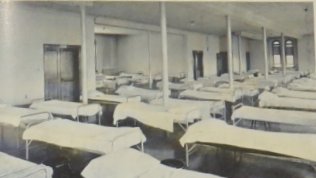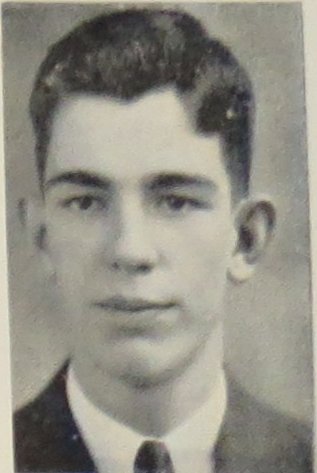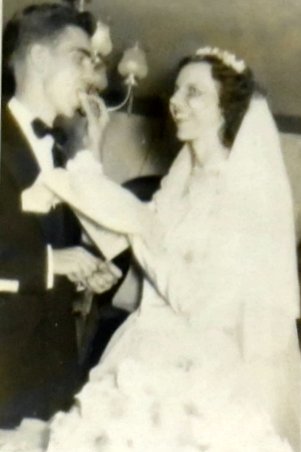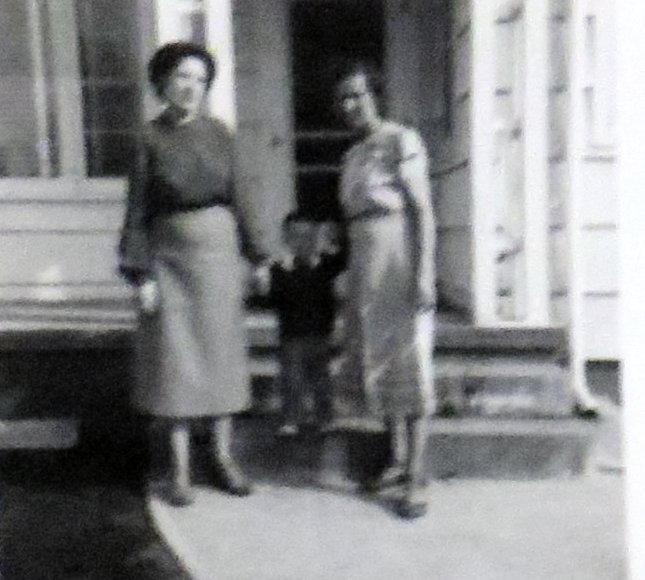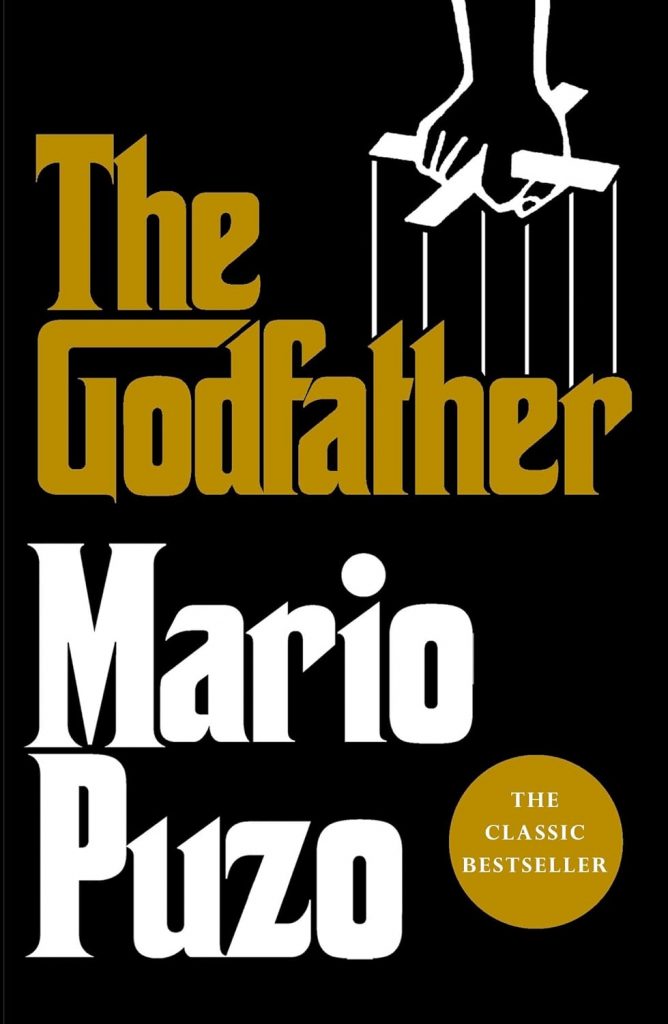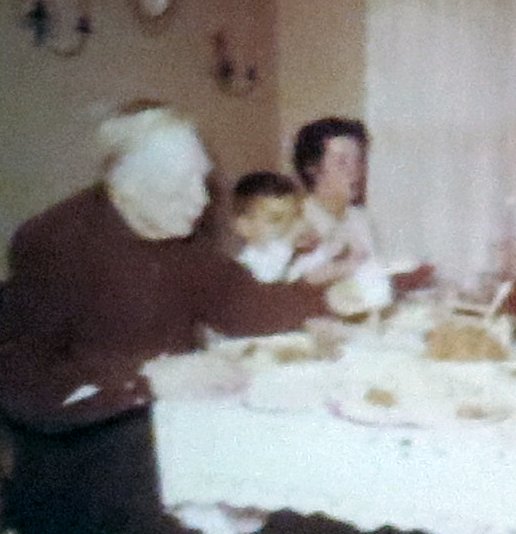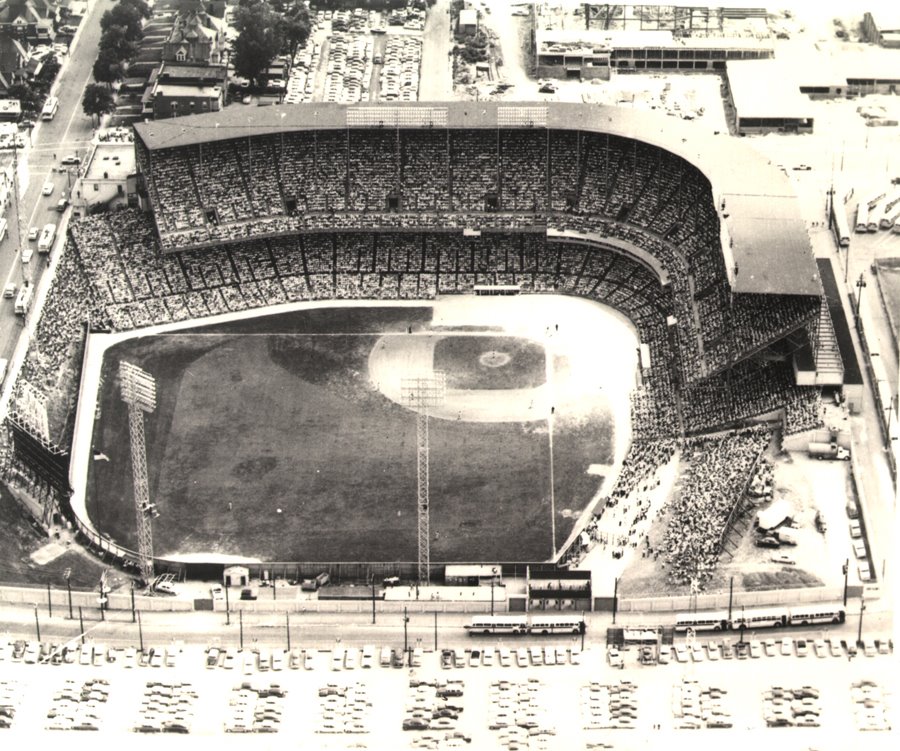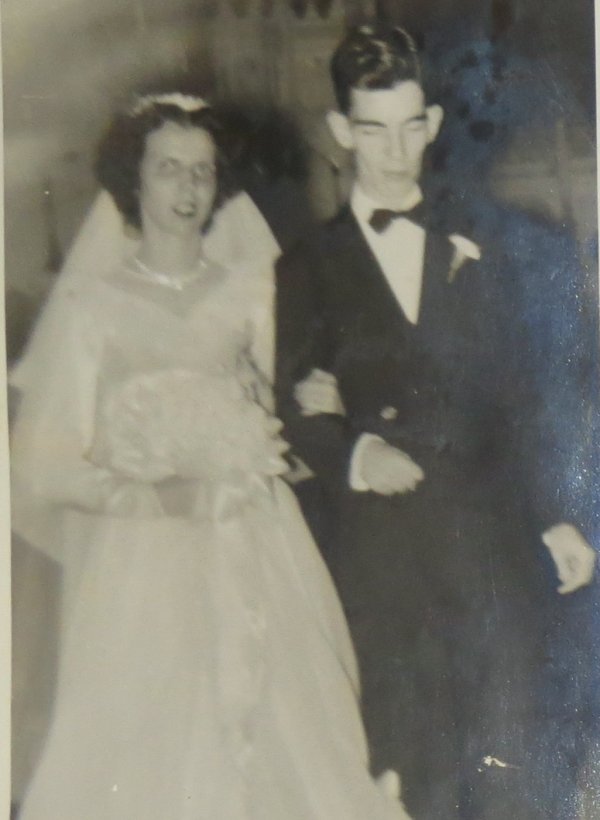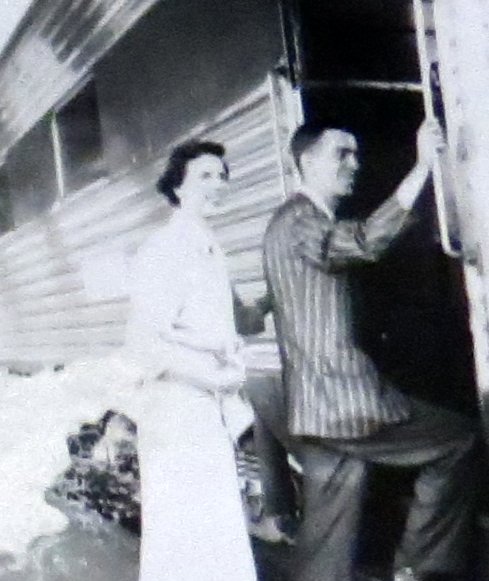My old man. Continue reading
I have limited the period covered by this entry to the years before I left for the army in October of 1970. The few face-to-face contacts that I had with my parents from my arrival in Connecticut up to the last time that I saw my mom are listed in the “Mom and me” blog entry.
James E. Wavada was born on August 25, 1924, or at least that is what he has always claimed. For some reason he was never able to locate his birth certificate. I learned about this when he encountered difficulty in obtaining an official ID card in 2005 after he moved to Connecticut. He was the youngest of the three sons of Henry and Hazel Wavada. They lived in Holy Name parish in the Rosedale section of Kansas City, KS. His two brothers were named Victor and Henry Joseph (Uncle Vic and Fr. Joe to me).
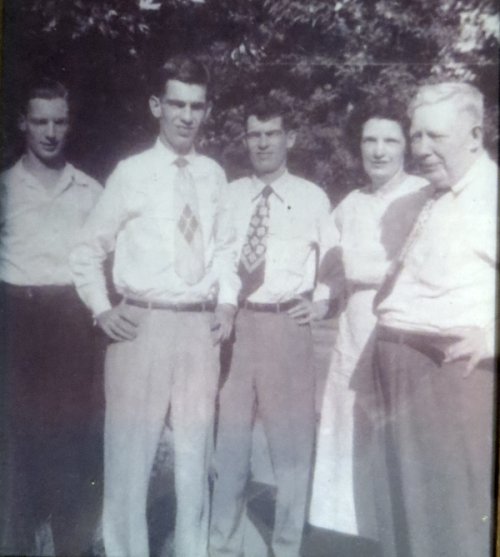
Hazel’s maiden name was Cox. My dad said that they were “Scotch Irish”, descended from the people whom the British government transplanted from Scotland to Northern Ireland. Hazel once confided to me that the Wade Hamptons1, powerful figures in South Carolina in the seventeenth and eighteenth centuries, were among her ancestors.
Henry was fifteen years older than Hazel. I think that they were both employed in the meat packing industry in some capacity. Henry’s ancestry is foggy to me.2 My dad considered himself Irish, but the first Wavadas (or whatever the name was originally) reportedly set sail from Marseilles and lived in Alsace. They apparently settled in Fort Wayne, IN.
Jim was decidedly left-handed. Swinging a golf club was the only thing that he did right-handed.3 His writing method involved curling his hand around so that he pulled the pen instead of pushing it. My understanding is that that meant that his right hemisphere was dominant and his cerebrum was contralaterally organized. The script that this produced was illegible to nearly everyone except for mom and his secretary.
As a youth dad reportedly had a temporary episode of alopecia totalis. It must have been very embarrassing for him, but all of his hair eventually grew back. I judged that the somewhat weird fact that his scalp hair was still dark when his eyebrows had turned white4 was probably related to that illness in his youth. I might be wrong.
For a while he called himself “Pibby”. Evidently he had difficulty saying “Jimmy”.
My dad never had anything good to say about his father, who was an alcoholic. He told me that Hazel had to pull him out of bars. Other anecdotes about Henry and his family have been posted here.
My dad and his two brothers grew up during the depression. It must have been extremely tough on Hazel, but she was up to it. She lived longer than all of my other known antecedents. She died in 1989 at the age of 90.
Jim and his brothers all matriculated at Maur Hill, a boarding school run by the Benedictine monks. It was located in Atchison, KS, approximately fifty miles from KC KS. Hazel reportedly negotiated a deal with the Benedictines that one of the boys would become a priest if all three were given scholarships. I know only a few things about my dad’s time at Maur Hill:
- His yearbook lists the following activities:
- Course: Classical
- Tatler (the student newspaper): 3
- Honor Roll: 2,3
- Sacristan: 2
- Pres. Servers’ Society: 4
- Student Manager Athletics: 3.
- The fact that no activities were listed with a “1” leads me to think that he probably attended Ward High as a freshman and then transferred.
- He won the school-wide oratory contest in 1942. This was not in his yearbook, but I learned about it when the school invited him back to judge the contest decades later, perhaps in 1962. I accompanied him to Atchison.
- He confided to me that he had been terrible at math (especially geometry) and French. The French teacher reportedly said that he had the worst French accent he had ever heard. I suspect that he got through the other subjects using his incredible memory and his writing and speaking talent.
- He learned to play back-handed ping pong. I played him once. He could not handle spin, but his reflexes were much better than mine.
- He learned from other students that smoking was cool. He became addicted to cigarettes for more than forty years.
- He learned to play golf, but the only clubs available were right-handed.
- A man named Henry Etchegaray, who lived in Mexico City but was in dad’s class at Maur Hill (and lettered in football!), visited us one time. I remember no details.
At some point while he was in high school he evidently met my mom. Maybe it was shortly after he graduated and she was on summer break . They never told me the details, and I never asked. I am pretty sure that they communicated by mail while he was in the army, but I have not seen any of the letters.
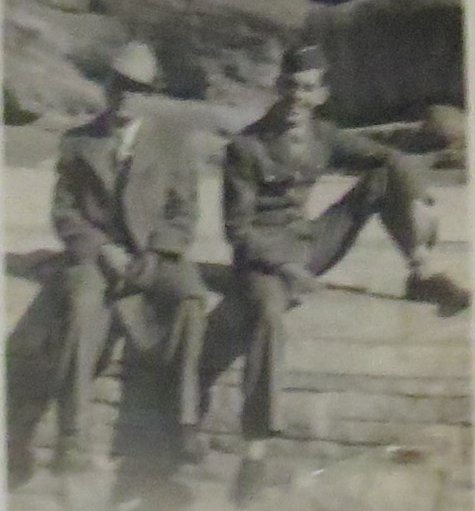
Shortly after high school he enlisted. He told me that he was rejected (in World War II!) by the navy for “insufficient chest and shoulder development”. Maybe it was just as well; he could not swim. I never saw him in a swimming pool or pond, but he did take a motorboat out on Cass Lake in Minnesota a few times.
He was six feet tall and weighed 123 pounds when he first donned the olive drab. His performance on the mechanical aptitude test that the army required new enlistees to take was so bad that the guy running the test accused him of cheating on the other tests.
He served in the Pacific in WW II. He almost never talked about it except to say that he did well in ping pong. He ended as a sergeant, but something that he mentioned once seemed to indicate that he had been busted a rank or two at least once. He had little respect for most of the other grunts that he served with, but he made one life-long friend in Jake Jacobson.
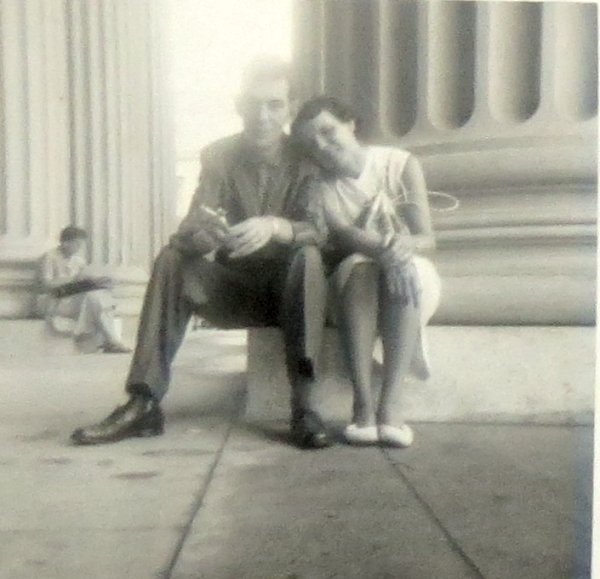
Fighting for more than two years against the Japanese definitely had a permanent effect on his world view. Our family never had rice for supper when Jim was in town. If he ever ate any oriental food, it was not until late in his life. He firmly believed that the two nuclear attacks ended the war. I wondered what he would have thought when historians began to assert that the Japanese government and military leaders were more concerned about the Russians’ invasion of northern islands than the immolation of civilians.
Nearly all of my dad’s friends went to college on the G.I. bill. He did not. I am not sure that he even considered it.
He married Dolores Cernech on September 1, 1947. His brother Joe, who had been ordained only three months earlier, officiated at the wedding in St. Peter’s cathedral in KC KS. What transpired in the year and a half between my dad’s discharge and the wedding? Decades later he disclosed two nuggets of information about that period: 1) Mom’s father was against the marriage, but Clara, her mother, somehow persuaded her husband that it was for the best; 2) He might have gotten into serious trouble if he did not get married. There were no more details, but he also mentioned something about pinball machines, which in those days were common in bars.
Life in KC KS 1948-54
The couple lived for seven and a half years in the house owned by Dolores’s parents, John and Clara Cernech. As far as I know, dad never worked anywhere except Business Men’s Assurance (BMA). I assume that he was employed there when he got married, but I could find no proof of it. As an employee he would have almost certainly received free health insurance. Otherwise, I cannot imagine how he could have afforded all of the medical bills my first few years on earth certainly generated.
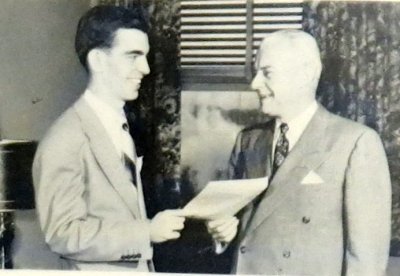
I can only imagine what my dad thought when he heard about my hare lip. He never talked about it later. In fact, I cannot remember him talking to me much at all in the years before I started school. The only memorable conversation was when he lightly reprimanded me for trading my Mickey Mantle baseball card to someone for a Vic Power card.
Dad was apparently pretty active at BMA. He started at the bottom, but by 1951 he was president of the KEO (“Know Each Other”) social club and one of four staff members on the company’s internal newspaper. In a short time he was transferred tp the sales department, where he eventually rose to the rank of Vice President. I think that he may have played a little baseball or softball there, too. The only equipment that he had was a first baseman’s glove. Although he sardonically referred to himself as “a natural athlete”, I never saw that side of him.
My only vivid memory of my dad in the house in KC KS involves the train set that he and Joey Keuchel set up “for me”5 in the basement. I am not sure how much my dad actually participated in that effort. I cannot remember ever seeing him use a tool as complicated as a screwdriver.
How dad got to work in the five years after my birth is unclear. Perhaps he took a bus or “street car” (trolly). In 1954 he bought a blue and white Ford. My recollection is that he had quite a bit of trouble with it. The word “lemon” was frequently employed.
I am pretty sure that Jake Jacobson visited us at least once before we moved to the suburbs. I remember that he had a big car, perhaps a convertible. He claimed that he could steer with his belly. When I got rambunctious he would cheerfully shout, “Michael, decorum!” I am pretty sure that the three of us rode with him to Swope Park for a picnic. A fair amount of beer was consumed. I remember a contest of pitching empty beer cans into the trash receptacle. In the fifties this was considered highly responsible behavior. People in those days thought nothing of hurling litter out of car windows. Let the prisoners clean it up.
I have a vague recollection of Fr. Joe taking me fishing at least once at Wyandotte County Lake. I don’t remember if mom or dad (very unlikely) was present. I seem to remember that there was a “gas war” going on. The going price was $.199 per gallon.
To my knowledge the only vacation that the three of us took was a long drive to Colorado to visit a man named Louis, who was one of Hazel’s relatives. I don’t remember his last name. This trip has been recounted here.
Prairie Village
In early 1955 the three of us moved to 7717 Maple, Prairie Village, KS, about twenty miles south of the house on N. Thorpe. My dad may have been in a car pool for work. Several BMA employees lived nearby.
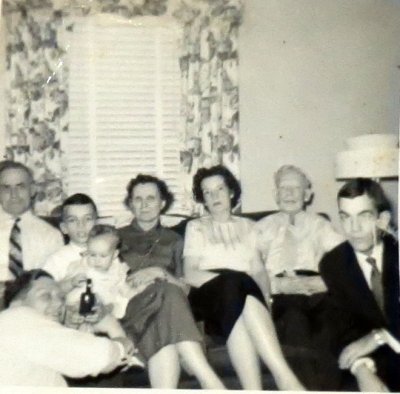
This was a big deal for me. We were in a new parish, which meant that I finished first grade at Queen of the Holy Rosary School instead of St. Peter’s. The Ursulines at QHRS seemed much nicer. Dad actually knew a few of them who had taught at his grade school in Holy Name parish in Rosedale.
When my sister Jamie arrived on the scene in January of 1956 dad must have been at least somewhat involved in picking her name. I don’t know how they came up with Jamesina. No St. Jamesina can be found in Wikipedia. They certainly did not ask my opinion. No one ever called her anything but Jamie.
Sometimes dad brought work home. On those occasions he sat at the kitchen table and filled up pads of paper with writing that reminded me of rain. Otherwise, he stretched out on our green sofa and read the newspapers (the Kansas City Star still had two editions), Time, Newsweek, or something about life insurance or marketing. He took no notes. He was not researching; he was absorbing.
If he read a book, it was non-fiction. I remember him reading only one novel ever, Mario Puzo’s The Godfather.. The salty language put him off.
He never watched movies. He said that he could not suspend disbelief. He saw people walking around furniture saying words that other people had written and feigning emotions. He attended one movie that I know of. It was a biopic, either Lust for Life, about Van Gogh, or The Agony and the Ecstasy about Michelangelo. He said that the movie was good, but, as far as I know, he never saw another one while he was in Kansas.
The only things that he watched on television were sports, especially football, and news. Occasionally he would peak at something that Jamie and I were watching. Batman comes to mind.
Dad and I watched football games as soon as they started appearing on television. I remember that the pros used a white ball for night games, and runners who were knocked down could jump back up and continue running. His favorite team was the Chicago Bears; mine was the Cleveland Browns.
We did no projects together, mostly because the only project that I can remember him doing was working on the lawn. I did the mowing,6 but he did some weeding, planting, fertilizing, and lots of watering. The results were mixed. I helped only when coerced. To me the weeds had the same esthetic value as his Kentucky bluegrass.
Dad took me to several games of the hapless Kansas City A’s, who played their games in Municipal Stadium, which was in a fairly rough neighborhood. My recollection is that we parked on the street for those games. These events have been described here. I don’t remember us talking about anything at the games except how pitiful the A’s were. We were definitely present for the legendary 29-6 loss to the Chicago White Sox on April 23, 1955.
We also took in one home game of Maur Hill football. I don’t remember who the opponent was, but they probably lost. I also have a vague recollection of attending a game at the University of Kansas. Since I remember no details of that event, I may have fantasized it.
Dad and I drove with our neighbor, Ed Leahy, to south-central Kansas one weekend. I don’t think that the Interstates were completed yet. We drove mostly at night. I remember sleeping in the back seat.
We spent one day hunting quail or pheasants and one day at the State Fair in Hutchinson. This adventure has been described here.
The family’s big vacation to the East Coast is detailed here. Dad did almost all of the driving.
I remember two other trips with my dad. I am not sure whether my mom was along. On the first one we visited dad’s Uncle Vic Wavada (Henry’s brother) in, I believe, Nevada, MO. I remember no details at all. Great-uncle Vic died in 1962. By the way, the town is pronounced locally as nuh VAY duh, miz URR uh.
On the other journey we visited an older man named Crispy Ward somewhere near Jefferson City, MO. He might have been a salesman for BMA. We went fishing together in a small boat. I doubt that my dad participated. I had trouble with my line getting caught up in the vegetation. Crispy nicknamed me “Snag.” Fortunately, it did not catch on.
Dad and I did not do very much together. He played catch with me occasionally. The only thing that I recall that he ever taught me was how to wash myself. My reaction was a silent “Well, duh.”
Did my dad have any friends in the area? He talked to a few of the neighbors. He and mom went to social occasions at the homes of some of the other BMA employees a few times. The only other friends that I can recall were Boots and Fay Hedrick. I seem to recall that dad, mom, or both knew them from KC KS. They had a son named John who was about my age.
I started wearing glasses in 1958 or thereabouts. My dad also wore glasses when he drove the car. Otherwise, he shunned their use. He nagged me about the fact that I put mine on as soon as I woke up and wore them continually until I went to bed. I took them off when playing football and whenever large amounts of water were involved. He could not understand why I always wore them. I wanted to see, and my prescription was much stronger than his was. The year before I got them I batted .000 in 3&2 baseball. It was humiliating. Give a kid a break.
The other thing that he nagged me about was putting my hands in my pockets. Whenever I heard him say, “You can’t climb the ladder with your hands in your pockets” I would spin my head around to see which ladder he was referring to. I never saw it.
Leawood
At the end of the 1961-62 school year the Wavadas moved south and east a few miles to 8800 Fairway in Leawood, KS. This house was much nicer than either of our previous two residences. It had three bedrooms, a large living room, a dining room, a rec room, a two-car garage, a basement, and an attic. It also had central air conditioning and a large fan in the ceiling of the hallway by the bedrooms. Every summer evening my dad would order the air conditioning turned off and the fan turned on. All the windows were opened except for the ones in my bedroom. I left mine closed and shut my door when I went to bed in order to muffle the sound of the fan.
My dad joined a car pool to BMA. Its members included Malcolm Holzer, the company’s treasurer, and Mac Dolliver, an actuary whose family lived only a block away from us. There was at least one other person in the car pool. In inclement weather they would drive me to Rockhurst High School. On most other days I walked.
For one of my birthdays my parents got me a wooden basketball backboard and orange rim of iron. My dad and, I think, my grandfather, John Cernech, mounted it on the roof above the driveway. The backboard was not quite vertical, and the rim broke in one place, but I still played there extensively.
A later Christmas present was a six-foot pool table that dad and mom clandestinely set up in the basement. Its surface was wood covered by felt that quickly warped, but I did not care. I practiced on it many evenings, especially in cold weather. While I did so I listened to my records on a portable turntable that I acquired somewhere. Nobody could beat me on my table because I knew how to play the “break” in the southeast corner.
At the new house dad had a much larger front lawn to maintain. He cared not a lick about the bushes, the side lawns, or the much larger back yard. I think that he was secretly competitive about this hobby. Our neighbors to the north, the Westergrens, had a thick lawn, but the grass was fescue, not bluegrass. Dad considered fescue to be weeds. It completely took over the lawn on the north side of the driveway. My dad concentrated on the 90 percent of the lawn that was south of the driveway. He waged a war against any fescue that somehow crossed the driveway.
By this time we had a self-propelled lawnmower. I was an energetic teenager; mowing the lawn was actually somewhat pleasurable for me. However, once a year dad rented a heavy machine that sucked up loose vegetation from the lawn. It was not self-propelled, and it was a huge pain to push.
As before, dad spent nearly every summer evening listening to news, sports, or talk on his small transistor radio. Never music; he no appreciation of music. Once in a while a song would strike his fancy, but I could not name even one song that he liked that was released between “Oh, My Papa” and “Leaving on a Jet Plane.” Seriously.
Dad had two season tickets to the Chiefs’ home games, which took place at Municipal Stadium until Arrowhead Stadium opened in 1972. Sometimes he took mom. Once or twice a year he took me. In 1965 he let me bring two friends from Rockhurst, Ed Oakes7 and Dan Waters. Win or lose, I had a great time at these games. From 1966 to 1969 I could not attend because I was in Ann Arbor. After that I never lived in KC in the fall.
I cannot remember anything about our communication during the games. We talked mostly about the players and strategy.
Dad had little involvement with my schooling. I sometimes rode to Rockhurst with him and the other members of his car pool. The only other involvement with my high school years that I recall involved speech competitions. He let me have his old Time and Newsweek magazines. I used them in my competition in extemporaneous speaking. They were very helpful.
Dad worked on projects with a Benedictine named Roger Rumery. Fr. Roger somehow obtained a book that explained in detail the process of learning to type. I spent a lot of time with it and an old Royal machine that was, I think, my mom’s.8 I became quite proficient at the keyboard. I used my new skill to type evidentiary quotes on index cards, arguments, and entire speeches. Later this skill became even more useful. Only God knows how many millions of words I have typed over the last sixty years or so.
Health
My dad was almost never ill, but he had problems with his back. At some point I am pretty sure that he had an operation that only helped a little, if at all. I have a vague recollection that he occasionally suspended himself in a closet in order to stretch something in his back. I never saw this, and I may have just concocted it from stories. At some point it must have gotten better. I don’t remember him wincing or complaining about it after the early sixties.
The only exercise that dad got was on the golf course. BMA purchased a family membership for the Wavadas at Blue Hills Country Club. Dad played there on weekends. He seldom used an electric cart. He walked with his bag in a two-wheeled cart that he towed behind him.
I must mention that although dad loved the game of golf, he was not very good at it.9 He had a good excuse. He was left-handed, and he was using right-handed clubs. He never mentioned this, and he never tried to swing left-handed, at least not to my knowledge. He did experiment with left-handed putting.
Dad and I played together several times per year. Did I enjoy it? Not really. He made me very nervous. He was always watching the group in front of us and the group behind us to make sure that we were not holding anyone up. I was (and am) not a good loser. When I hit a bad shot, I beat myself up over it. I had made a pretty detailed study of the golf swing (described here). I knew how to correct a slice (often) or hook (almost never). It frustrated me enormously that the balls sometimes did not go where I planned.
Nevertheless, playing with him raised my game up to respectability. I did enjoy the competition when I was playing as part of a pair or a team. I played on my company’s team in the army (related in some detail here) and in the golf league at the Hartford. My partner John Sigler and I were in first place in the entire league when I broke my kneecap. Those adventures have been chronicled here.
Occasionally he asked me for evaluations of his swing. I never volunteered an opinion. If I had, it would have sounded something like, “Well, your grip is wrong, and your stance is wrong. It is hard for me to say anything until you change them.”
His reply to my silence would be something like, “I think that I am pushing the ball”, “Am I swaying?”, or “I need to swing through it more.” I had no idea what any of these meant in terms of body parts involved in a golf swing.
My dad played golf until he became lame and blind in his eighties. For decades after I left the Hartford I could afford neither the time nor the expense of the game. In my seventies I had absolutely no regrets about giving it up.
Friends
My parents seemed to have a lot more friends in Leawood than they did in Prairie Village, but not in the neighborhood. Most of them were parishioners at our new parish, Curé of Ars. The two that I remember the most were Mike Goral, a golfing buddy, and Phil Closius. They were both transplants from the New York area.
What I inherited from my dad:
- Physical build
- Hair color
- Head shape
- Speaking and writing abilities
- Political tendencies
- Love of travel, although I did not witness this much as a youngster.
1. The three Hamptons named Wade were very influential in South Carolina in the eighteenth and nineteenth centuries. If Hazel was a direct descendant (she might have said “related to”), I suspect that Dr. Henry Louis Gates, Jr. would be able to tell me exactly how many slaves they had, but rest assured that there would be a comma in the answer.
2. A fairly large number of Wavadas lived in the Spokane, WA, area. One of them has done genealogical research. My dad had a copy of her findings, but, unfortunately, when he died Sue got her hands on it, and it entered the black hole of her existence. If I had to guess, I would place it in her garage, which has long been impenetrable.
3. Not quite true. I found one photo of him with a cigarette in his right hand.
4.Mine was just the opposite. My scalp was almost completely grey when the first white hairs appeared in my eyebrows.
5. I had no say in the design, and I only was allowed to handle the controls a few times under strict supervision.
6. I would have been too small to handle a lawnmower in the first few years in PV. Someone else must have done it. My money is on my mom.
7. My recollection is that Ed did not bring a jacket and was shivering by the second half.
8. It must have been. My dad certainly did not know how to type. He hunted and pecked.
9. For some reason he was pretty good at using a 3-wood from the fairway. Most people consider this one of the most difficult in the game. He was also a much better putter than I was.


